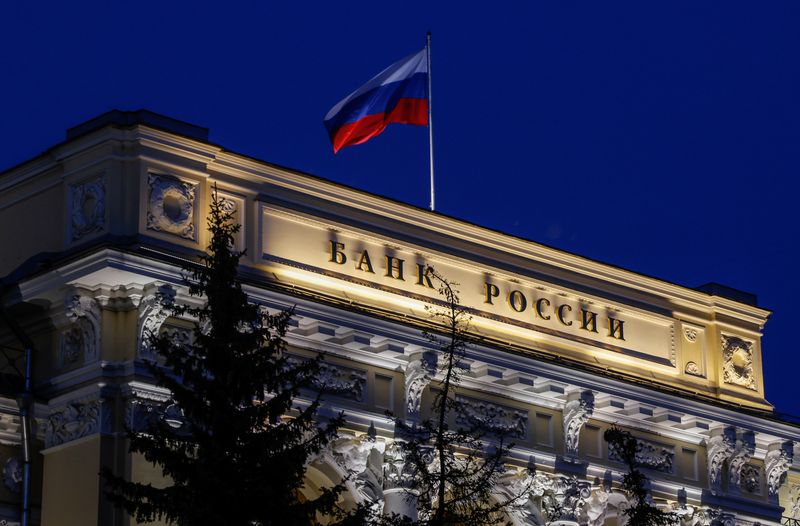(This content was produced in Russia where the law restricts coverage of Russian military operations in Ukraine)
MOSCOW (Reuters) - Russia is considering buying the currencies of "friendly" countries such as China, India and Turkey to hold in its National Wealth Fund (NWF), having lost the ability to buy dollars or euros due to sanctions, the central bank said on Friday.
The bank said it was sticking to the policy of a free-floating rouble exchange rate but highlighted that it was important to reinstate a budget rule which diverts excess oil revenues into the country's rainy day fund.
In a report on its monetary policy for 2023-2025, the central bank said various options on how to return to the fiscal rule and replenish the NWF are now being discussed, taking into account the Western sanctions against Russia over its actions in Ukraine.
"The Russian Ministry of Finance is working on the possibility of implementing an operational mechanism of the budget rule mechanism for the replenishment/spending of the NWF in currencies of friendly countries (yuan, rupees, Turkish lira and others)," the central bank said.
Experts have voiced concerns about insufficient liquidity in such currencies and about the possible risks. Inflation in Turkey, for example, jumped to nearly 80% in June, a 24-year high.
Alexei Zabotkin, the central bank first deputy governor who presented the monetary policy report on Friday, said the parameters of the new budget rule were still under consideration. He pointed out that liquidity in yuan-rouble trading has approached the levels of the euro-rouble currency pair on the Moscow Exchange.
In the first half of 2022, average daily trade turnover for the yuan rose more than 12-fold, according to the exchange.
Under the budget rule, Russia previously bought dollars and euros for the NWF, but not the other currencies. It stopped daily purchases of forex for the fund in early 2022 amid increased volatility in the rouble.
The NWF is managed by the finance ministry but is part of the central bank's international reserves, which also include yuan. These totalled around $640 billion as of February, of which nearly half was frozen under Western sanctions.
ECONOMY AND RATES
The Russian economy will return to growth in 2024 after two years of contraction, according to the central bank.
"Economic contraction in Russia will bottom out in the first half of 2023," Zabotkin said.
Inflation will slow to the 4% target in 2024, allowing the central bank to bring the key rate down to the 5%-6% range in 2025, the bank said, compared with the current 8%.
"Further developments in the Russian economy are characterised by substantial uncertainty... The main challenge in the coming years is to create the conditions for a successful transformation of the economy," the bank said.
The key interest rate, the main instrument of central bank monetary policy, will average 6.5%-8.5% next year and will gradually decline to 6%-7% in 2024 and 5%-6% in 2025, the bank forecasts in its base case scenario.
The central bank also said it saw no strong reason to keep capital controls in place once the risks to the country's financial stability subside.
Russia introduced capital controls after Feb. 24, when it began what it calls a special military operation in Ukraine. The controls were aimed at limiting the risks to financial stability, including by imposing a limit on withdrawals of foreign currency funds from bank accounts.
